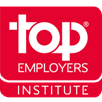 Top performing employers no longer rate employees, but instead provide coaching and development opportunities
Top performing employers no longer rate employees, but instead provide coaching and development opportunities- Continuous feedback replaces yearly event
- Performance gets redefined as employee’s impact on team and ability to collaborate
- Less links between Performance Management and pay
- HR trend in India: Long-term professional growth replaces opportunistic job-hopping
New Delhi, June 1st, 2015: Forced performance rankings of employees are becoming a thing of the past. Instead, top performing employers are moving towards more transparent goal setting and more regular feedback as part of simpler and less formal performance reviewing. That is the conclusion of the Performance Management Report published today by the Top Employers Institute. The study is based on a global HR Best Practices Survey among 600 companies in 99 countries.
91% of the companies that qualify for the Top Employers status are now consistently re-aligning performance goals during the year in response to changing business needs, marking a major shift away from the traditional annual review, and towards providing ongoing feedback.
Indian employees are often driven by opportunistic motives, causing them to job-hop if they can get a better salary elsewhere. A trend seen by Top Employers Institute is a shift to more long-term and on professional growth, internal career opportunities and objective measures of performance.
This is confirmed by Dimension Data India: “We see that by changing the way we are measuring performance, we can change attitudes of employees towards looking for opportunities to develop a career out of a longer-term relationship with the same employer. Changing employers is no longer seen the most effective career move”, said Ulhas Aher, Head – People & Culture, Dimension Data India Pvt. Limited.
He further added, “In our company, Performance Management is a key tool for the execution of any strategy and vision. A Performance based culture helps to achieve organizational goals easier. Better learning opportunities for employees is one of the aspects that we should look at for employees’ self realization and understanding organizational goals”
Traditional performance measurement seen as over-engineered
While employers consider it important to measure performance, current processes are seen to have become too complex and over-engineered, reliant on rating scales that are perceived as not fit anymore to measure performance in today’s working environment. The survey shows a trend for employers to offer coaching and development opportunities, rather than rankings.
 “A key finding of our study is that Performance Management evolves from an annual event with rigid objectives to a transparent process of continuous dialogue, with flexible goals, that is more embedded in day-to-day operations so it can better deal with change. Companies that become Top Employers redefine performance as the ability to collaborate and contribute to the success of a team”, states David Plink, CEO of the Top Employers Institute. “We are definitely on the verge of a paradigm shift in the way we look at Performance Management.”
“A key finding of our study is that Performance Management evolves from an annual event with rigid objectives to a transparent process of continuous dialogue, with flexible goals, that is more embedded in day-to-day operations so it can better deal with change. Companies that become Top Employers redefine performance as the ability to collaborate and contribute to the success of a team”, states David Plink, CEO of the Top Employers Institute. “We are definitely on the verge of a paradigm shift in the way we look at Performance Management.”
Previously the focus for Performance Management had been on the individual and individual tasks. But as many companies foster a more connected and team-based working culture, traditional performance measures do not reflect that anymore. Key capabilities are now social awareness, agility and flexibility so that top performing companies aim to assess the effectiveness of employees in the broader work environment.
As a consequence Top Employers are increasingly encouraging their teams to be more involved in their own Performance Management so they can feel in control of their own progression. Those companies have realised that an inclusive approach helps support a high performance culture which helps accelerate the company’s strategy.
Microsoft: “We redefined performance as the impact an employee has on a team.”
Microsoft, a certified Top Employer has completely overhauled its existing approach by removing all ratings in favor of a new, conversation-based approach to performance. Lisa Dodge, Director Global Performance Programs at Microsoft, stated: “Traditional Performance Management was not going to get us where we need to go. We redefined performance as the actual impact an employee has on a team, business or customer.”
Finally, the survey highlights a weakening link between Performance Management and compensation, with only just over 10% of participants considering an important objective of the process being to provide a basis for salary increases. This shows how the overall objectives of Performance Management are changing. A rigid link between performance and pay enforces a strong emphasis on individual performance, but is not effective when looking at an employee’s contribution to the performance of the organization or the development of other employees.
About the Performance Management Report
The Performance Management Report is the second report in a series of reports on employee conditions. It is based on the findings of the Top Employers HR Best Practices Survey, surveying a sample size of 600 certified organizations in 99 countries with more than 3.000 employees each. Free preview can be found on hr-insights.top-employers.com/report-summary-performance-management
The global HR Best Practices Survey assesses an organization’s HR environment in the areas of: strategy, policy implementation, monitoring and communication of employee conditions and development. The Top Employers Institute globally certifies excellence in the conditions that employers create for their people. More than 960 Top Employers were successfully certified in 2015. www.topemployers.com
